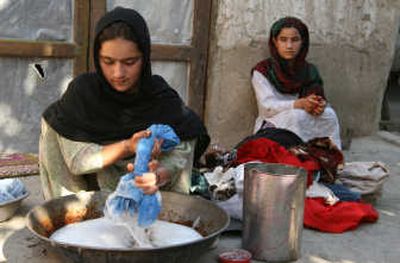Progress doesn’t end barter of Afghan girls

JALALABAD, Afghanistan – Unable to scrounge together the $165 he needed to repay a loan to buy sheep, Nazir Ahmad made good on his debt by offering his 16-year-old daughter to marry the lender’s son.
“He gave me nine sheep,” Ahmad said, describing his family’s woes since taking the loan. “Because of nine sheep, I gave away my daughter.”
Seated beside him in the cramped compound, his daughter Malia’s eyes filled with tears. She used a black scarf to wipe them away.
Despite advances in women’s rights and at least one tribe’s move to outlaw the practice, girls are traded like currency in Afghanistan and forced marriages are common. Antiquated tribal laws authorize the practice known as “bad” in the Afghan language Dari – and girls are used to settle disputes ranging from debts to murder.
Such exchanges bypass the price of a traditional betrothal, which can exceed $1,000. Roughly two in five Afghan marriages are forced, according to the Ministry of Women’s Affairs.
Though violence against women remains widespread, Afghanistan has taken significant strides in women’s rights since the hard-line Taliban years, when women were virtual prisoners – banned from work, school or leaving home unaccompanied by a male relative. Millions of girls attend school and women fill jobs in government and media.
There are also signs of change for the better inside the largest tribe in eastern Afghanistan – the deeply conservative Shinwaris.
Shinwari elders from several districts signed a resolution this year outlawing several practices that harm girls and women. These included a ban on using girls to settle so-called blood feuds – when a man commits murder, he must hand over his daughter or sister as a bride for a man in the victim’s family. The marriage ostensibly “mixes blood to end the bloodshed.”
Jan Shinwari, a businessman and provincial council member, said a BBC radio report by a female journalist from the Shinwari tribe, Malalai Shinwari, had exposed the trade of girls and shamed the elders into passing the resolution to end the practice.
“I did this work not because of human rights, but for Afghan women, for Afghan girls not to be exchanged for stupid things,” Jan Shinwari said.
However, Shinwari leaders insisted that women given away for such marriages – including those to settle blood feuds – were treated well in their new families; Afghan women say that could not be further from the truth.
“By establishing a family relationship, we want to bring peace. But in reality, that is not the case,” said Hangama Anwari, an independent human rights commissioner and founder of the Women and Children Legal Research Foundation.
The group investigated about 500 cases of girls given in marriage to settle blood feuds and found only four or five that ended happily. Much more often, the girl suffered for a crime committed by a male relative, she said.
“We punish a person who has done nothing wrong, but the person who has killed someone is free. He can move freely, and he can kill a second person, third person because he will never be punished,” Anwari said.